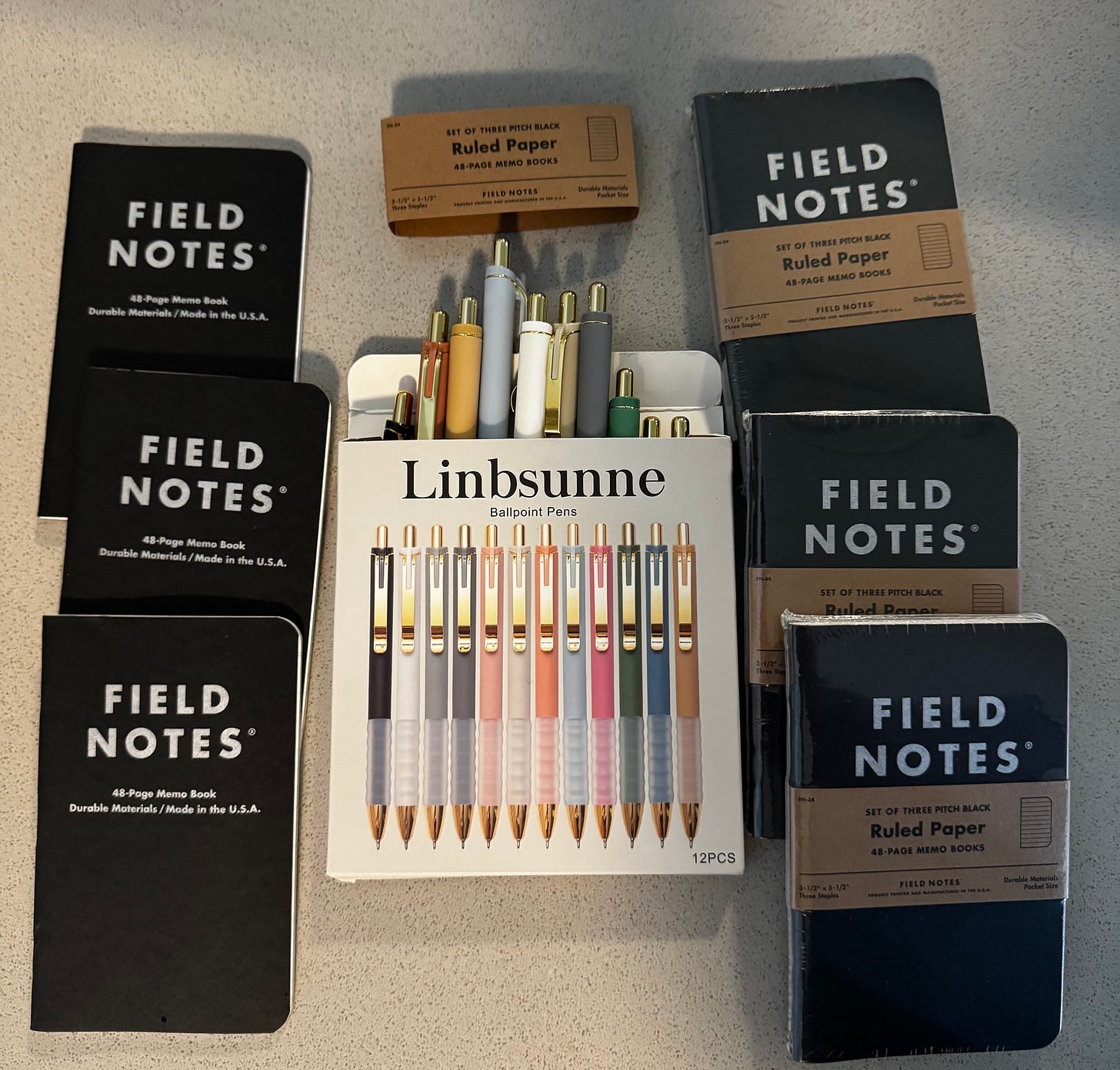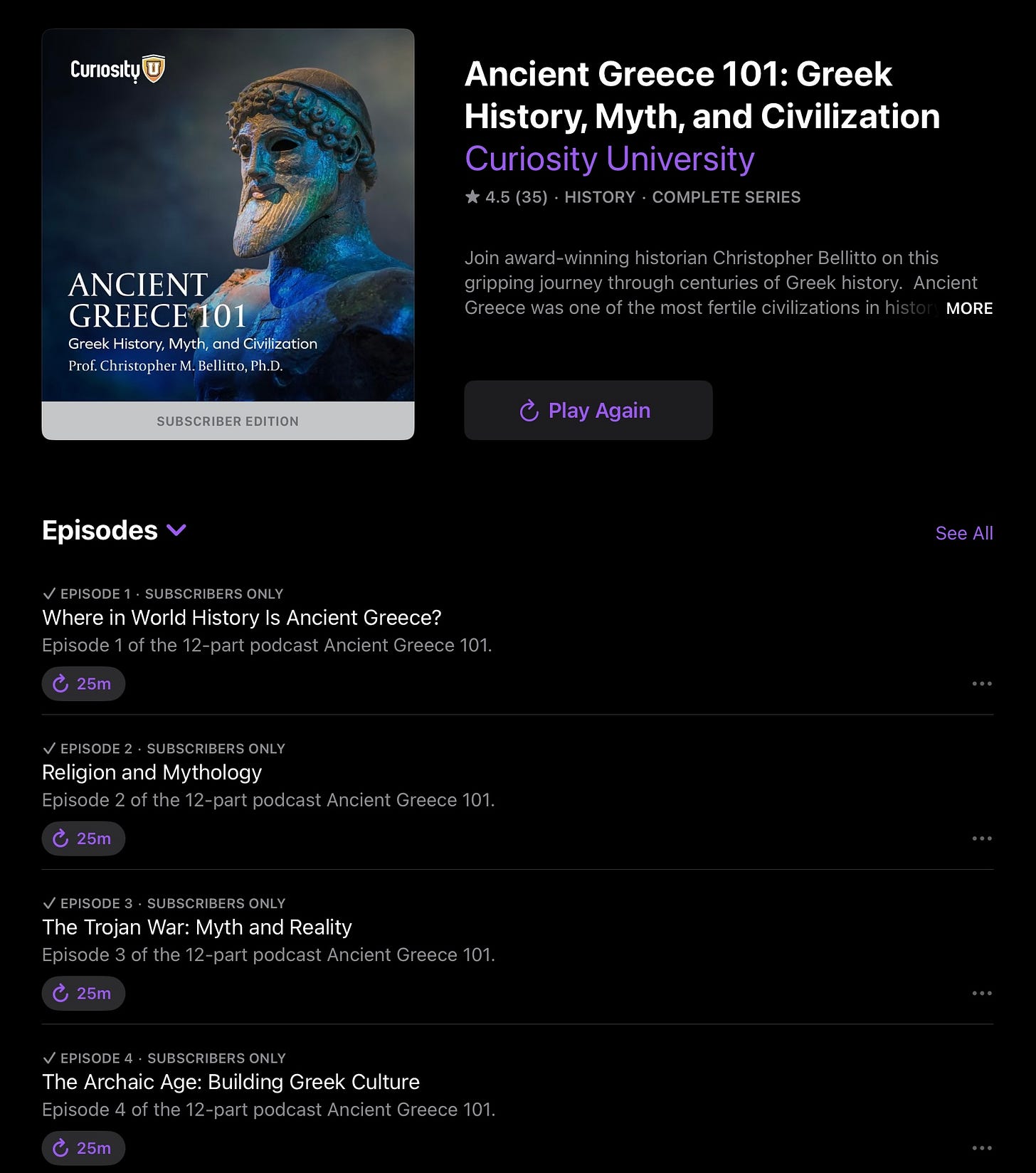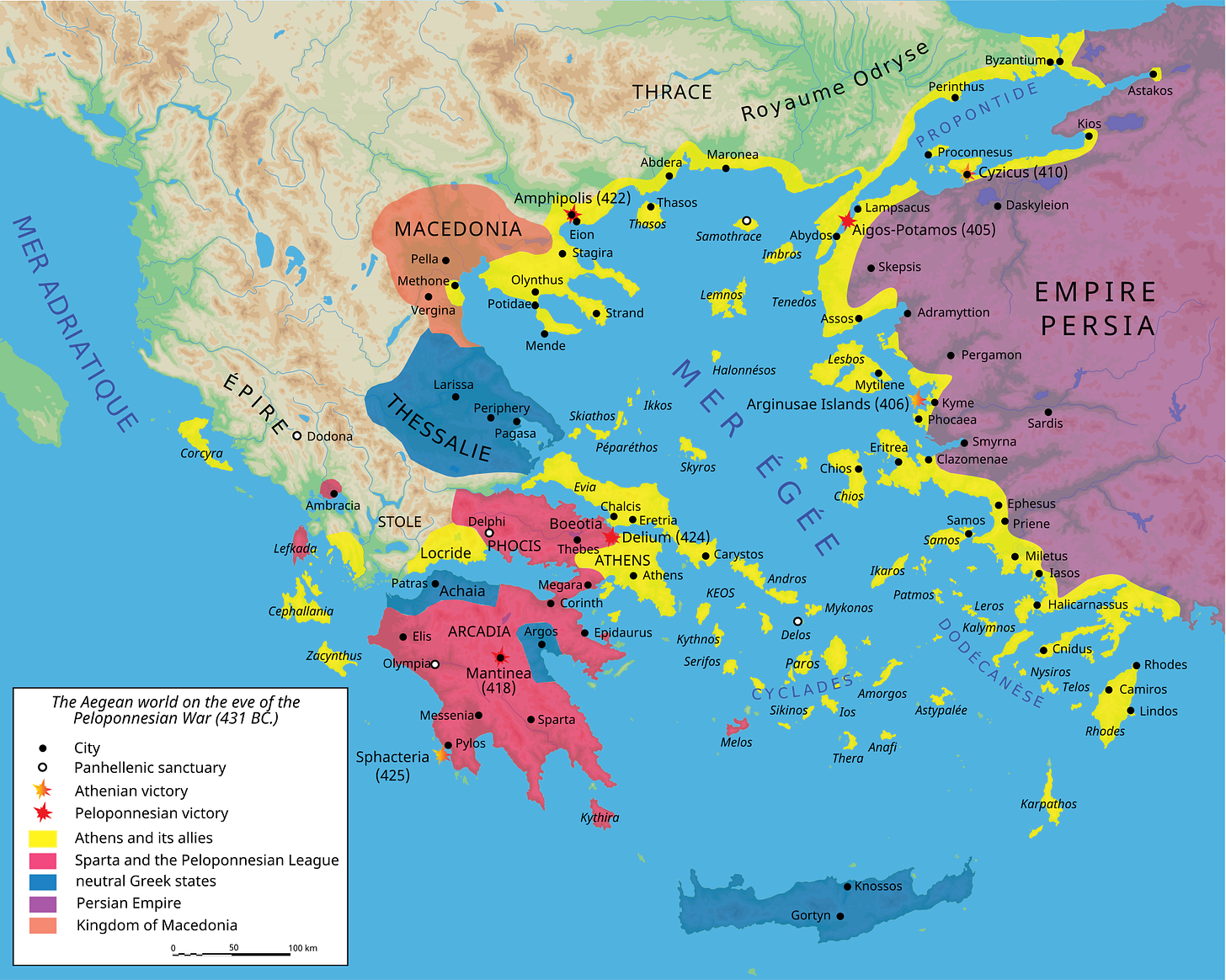Countdown to Greece~!
The Value of Notebooks and Travel Prep; Connecting Ancient Egypt, Imperial Rome, and Classical Greece; Final Preparations.
Thirteen of us (including 7 teenagers!) will be taking off for Athens, Greece next Friday (8 days and counting)!
I’ve said it many times but it’s true: Every trip has three parts: Preparation, Experience, and Rememberance.
Now we are deep into the final Preparation Phase.
I left my notebook on the sailboat last Thursday. It’s surprising how much I missed having the ability to put down fleeting thoughts on paper at all times, and even more surprising how many ideas disappeared into the ether before they were captured, perhaps never to appear again.
It reminded me of the importance of a travel journal. Here’s what Rick Steves’ says about that (from his packing list web page):
Notepad and pen. A small notepad in your back pocket or day pack is a great organizer, reminder, and communication aid.
Journal. An empty book to be filled with the experiences of your trip will be your most treasured souvenir. Attach your itinerary. Use a sturdy journal designed to last a lifetime, rather than a floppy spiral notebook.
For some reason just writing a sentence or two in a notebook locks down a thought. Taking notes during the day for me is like collecting sticks to build a fire, or logs to build a cabin. Each sentence or phrase has the potential to grow into a paragraph, or even an entire article.
But if not captured the thought often evaporates. This is especially true when you travel. Your guide offers up a brilliant insight while you’re standing before an ancient wonder but the idea evaporates at the next stop.
It’s the way our minds work. There’s only so much room in the “screening room” of our brains, so recent ideas must make room for the next one.
Over the past four or five days I’ve had some good ideas about articles but without a notebook at hand many have disappeared. It could be my advancing age, but I think it’s more than that.
Somehow the very act of writing down words on paper gives an idea substance that otherwise is lost. Writing puts the idea not just onto paper, but into your brain.
I’ve purchased notebooks for everyone to use on our upcoming Greek Adventure. (Opening photo). My plan is to wait until we’re all at the airport, then pass them out. And the BW bought a box of nice ballpoint pens, too. I hope to encourage the grandkids to take a few notes each day to help them lock in some of the ideas and impressions of the trip.
I am also thinking about a daily photo or sketch contest. Each person would submit their favorite pic or sketch of the day.
Traveling is a skill that can last a lifetime. I need to remind myself of the importance of the form that our travel takes as well as the substance. Note-taking (and of course photography) is one of the key travel skills I hope to pass on to the younger generation.
Greece, and particularly Athens, provides us with one of the earliest glimpses of the ideas that would form our Western European civilization.
I just finished listening to Ancient Greece 101: Greek History, Myth, and Civilization Podcast, by Prof. Christopher Bellito, on Curiosity U, screen shot above. I think it is an excellent overview of Greek history. There are some other podcasts out there as well that I hope to get through.
The nice thing about the Ancient Greece podcast is that it puts people and ideas in context with the time. To understand the trial of Socrates, for example, it’s important to realize that Athens had just been defeated by Sparta in the Pellopenesian War.
The Athenians were upset with Socrates. He had been correct in his earlier criticisms. Plus his friend Alcibiades had defected to Sparta. Plato depicts Alcibiades as a student and lover of Socrates who would. In time Alcibiades would be the ruin of Athens through his change of allegiance in war. So there was a lot more behind Socrates’ death sentence.
It’s so helpful if you can tie your trips together historically.
On our last European trip we boated down the Danube through the Iron Gates, the northern borders of the Roman Empire. Alexander went east, where the Persian threat lay, rather than north. See, Farewell to the Lower Danube.
We enjoyed several days in Rome in November of 2024, covered in these journal entries: A Rainy Day in Rome; Ars Pacis Augustae: A Hidden Gem in Rome; Piazza del Popolo; Gardens of the Villa Borghesi
Then most recently we had the trip of a lifetime to Egypt and the Nile. See, e.g., Bread and the Galabeya: The Value of a Great Travel Agent.
So I really want to connect Greece with Ancient Egypt and Imperial Rome. And it’s surprisingly easy to do!
My “Cheat Sheet” Time Line (see below) helps make the connection between the Egyptian, Greek and Roman civilizations.
I love the way that history flows, one era blending into another. Ancient Greece provides an important link between the Ancient Egyptians (over 3000 years) and the Roman Empire (510 BCE - 476 CE).
Here’s a link to my article Our Top Travel Hacks, always a good thing to review before traveling.
I usually remember to take a small sketch pad and some pencils. If I can find the time during the trip, an hour or so, I love to make a little sketch of a place. There is great peace in just observing and sketching the scene.
Oh I’m a terrible artist. And I won’t bore you with my bad art. But I keep the sketches in my closet. Even though they’re very crude, just glancing at the sketch takes me back in time to the very spot.
Do you have any ideas for good travel sketch pads? I’d love to hear them! If nothing else you can sketch in a lined journal, but an unlined pad is better.
We have our Wednesday night sail boat race tonight on Lake Erie. I plan to sleep on the boat then head to the cottage to prepare for the Great Fireworks Feast on Saturday. I’ll be grilling up 10 chickens for the crew (with plenty of help, of course). It’s one of my favorite days of the year.
Signing off for now. Thanks for sailing along~!
Greek History Cheat Sheet (All Dates BCE)
Year 490 BCE (Before the Common Era) Persians Attack Naxos and Paros. Naxos holds off the Persians but Paros falls.
481 Naxos, Athens, Sparta, Korinth, and other Greek Polis unite v. Persians.
Beginning of Classical Greece: 480 - 323 BCE
480. Leonidas of Sparta sacrifices 300 soldiers at the Battle of Thermopylae v. The Persians. (Movie “300”)
478. Delian League is formed, initially including Sparta. All of the allied Greek City States put their treasure on the island of Delos.
468. Playwright Sophocles defeats Aeschylus for the Athenian Prize in Drama.
457. Pericles, Athenian Statesman, leads Athens into the Golden Age.
454. The treasures at Delos are removed to Athens.
432. End of the “Golden Age of Athens.”
431. Sparta prepares to destroy Athens.
429. The Plague ravages Athens, killing Pericles.
428. Plato is born.
405. Sparta captures the Athenian Fleet.
404. Athens capitulates to Sparta, the Delian league is dissolved, and Athens joins the Pelopennesian League.
399. Socrates sentenced to death.
347. Plato dies.
342. Aristotle begins to teach Alexander.
338. King Philip II of Macedonia defeats Athens and Thebes.
336. Alexander succeeds his father Phillip II, who is assassinated (probably by his wife, who is Alexander’s mother)
333. Alexander defeats the Persians but Darius III escapes.
332. Alexander conquers Egypt and founds Alexandria after being called “The son of Amun Re.” (70 cities named “Alexandria” were planned, 17 have actually been identified).
331. Alexander the Great enters Babylon.
323. Alexander the Great dies, ending the Classical Greece Era.
305- 30 BCE Ptolemaic Era in Egypt.
305. Ptolemy, one of Alexander the Great’s Generals, founds the Ptolemaic Dynasty of Egypt which will rule for over 200 years until Egypt is incorporated into the Roman Empire.
300. Euclid, Greek Mathematician, publishes Elements, on geometry and number theory.
265. Archimedes, Greek Mathematician, describes specific gravity and integral calculus.
The Rise of Rome…
30 BCE. Rome defeats the Ptolemaic Dynasty of Egypt. Cleopatra commits suicide.







Hi David! These are some great ideas. I want to supplement: take photos of signs that give details on what you're seeing. I'm not so much of a note taker during the day, but I will generally write (on computer) what I remember from that day once I'm back in the room. Sometimes it will be impressions or thoughts that I've had that were inspired by the sites. Very soon after I get home, I go through the photos (with the itinerary right next to them) and then create a memory book. Honestly, much better to have a book than to have to always go through my phone! In the old days, I'd print my photos as soon as possible after getting home and then create an album. (In some ways, when you were aware of the cost of film, you made sure to get the good shots and you weren't as swamped as we are today with the hundreds on our phones.) The first time we took our daughter to Europe, she was almost 6. We went through the photos multiple times and 30 years later, she still remembers the trip! I agree: you have to capture the trip somehow so it remains live!
I got a little “pocket printer” with sticky back notes to use - I’m super excited!